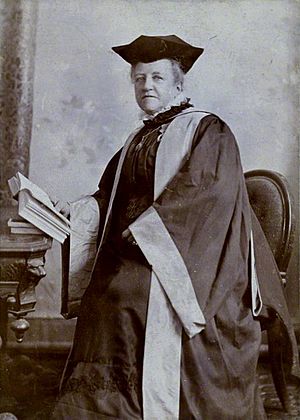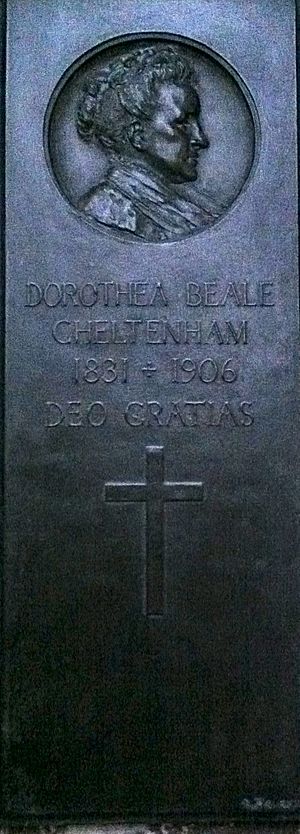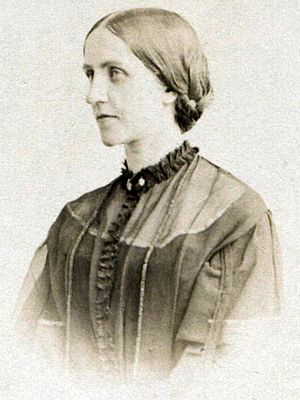Dorothea Beale facts for kids
Quick facts for kids
Dorothea Beale
|
|
|---|---|
 |
|
| Born | 21 March 1831 Bishopsgate, England
|
| Died | 9 November 1906 (aged 75) |
| Nationality | British |
| Occupation | Educator, suffragist |
| Known for | Second Principal of The Cheltenham Ladies' College and founder of St Hilda's College, Oxford |
Dorothea Beale (born March 21, 1831 – died November 9, 1906) was an amazing woman who worked hard to improve education for girls. She was also a suffragist, meaning she believed women should have the right to vote. As the head of Cheltenham Ladies' College, she helped create St Hilda's College, Oxford, which is now a part of Oxford University.
Contents
Early Life and Education
Dorothea Beale was born on March 21, 1831, in Bishopsgate, London. She was the fourth of eleven children. Her father, Miles Beale, was a surgeon who cared a lot about education and helping society.
Dorothea was taught at home and at a school in Stratford, Essex until she was 13. She also went to lectures at Gresham College and the Crosby Hall Literary Institution. She was very good at mathematics.
In 1847, Dorothea and her two older sisters went to a fancy school in Paris. But the school closed in 1848 because of a revolution. After that, Dorothea and her sisters were among the first students at the new Queen's College in London.
Starting Her Career
In 1849, Dorothea Beale became a mathematics tutor at Queen's College. By 1854, she was the head teacher of the school connected to the college.
During her holidays, Dorothea visited schools in other countries like Switzerland and Germany. In 1856, she visited the Deaconess's Institute in Kaiserswerth. She even wrote a small book about the institute.
At the end of 1856, she left Queen's College because she wasn't happy with how it was run. In 1857, she became the head of the Clergy Daughters' School in Casterton. She wanted to make many changes there, but she ended up leaving after a year. However, many of her ideas for improvements were put in place later. In 1858, she created a scholarship for students from Casterton School to go to Cheltenham.
While looking for new work, Dorothea taught math and Latin. She also wrote a history textbook for teachers.
Leading Cheltenham Ladies' College
On June 16, 1858, Dorothea Beale was chosen to be the principal of the Ladies' College, Cheltenham. This was one of the first schools in England specifically for girls. When she started, the school had only 69 students.
The school had a tough start, but Dorothea worked hard to make it successful. By 1863, the number of students had grown to 126. The school kept growing and moved to its own buildings. By 1880, there were 500 students! The college continued to expand, adding more buildings and facilities. By 1912, it had over 1,000 students and 120 teachers.
Dorothea's success was noticed early on. In 1865, she shared her ideas with a special commission looking into schools. Her ideas, along with others, really helped improve education for girls in England. In 1869, she published a book with reports on girls' education, showing how much it needed to get better.
Creating St Hilda's College
Dorothea Beale realized that there weren't enough ways to train teachers. To help with this, she started a training college in Cheltenham in 1876. This college grew quickly and became the country's first residential training college, called St Hilda's College. It opened in 1885.
To give teachers even more opportunities, Dorothea bought a house in Oxford in 1892. This house became St Hilda's Hall of Residence for Women in 1893. It allowed teachers in training to study at Oxford. Later, in 1901, it joined with the Cheltenham training college to form St Hilda's Incorporated College.
Dorothea also started a kindergarten class at Cheltenham in 1876. Soon after, a department for training kindergarten teachers became a big part of the college's work.
Other Contributions and Legacy
In 1880, Dorothea started The Cheltenham Ladies' College Magazine to connect past and present students. She edited it until she passed away. She also created 'The Guild of the Ladies' Cheltenham College' in 1884, which had 2,500 members by 1912.
The Guild also started a community center in Bethnal Green called the Cheltenham Settlement, which is now St Hilda's East Community Centre. Dorothea was a very religious person and started special devotional meetings for teachers at Cheltenham.
Outside of her college work, Dorothea was involved in many efforts to improve education. She was the president of the Headmistresses' Association from 1895 to 1897. She also gave her opinions to a Royal Commission on Secondary Education in 1894. She even wrote a book called Work and Play in Girls' Schools (1898) about her ideas on girls' education.
Dorothea Beale also strongly supported the movement for women's suffrage, believing women should have the right to vote.
Later Years and Honors

Even in her later years, Dorothea remained very active, despite some health challenges. In 1901, she was given the honorary freedom of the Borough of Cheltenham for all her amazing work.
On April 11, 1902, the University of Edinburgh gave her an honorary degree (LL.D.) to recognize her huge contributions to education. She was only the second woman to receive such an honor at that time.
Dorothea Beale passed away on November 9, 1906, after an operation. Her ashes were buried in a special vault in Gloucester Cathedral. Her legacy continues to inspire many in education.
See also
 In Spanish: Dorothea Beale para niños
In Spanish: Dorothea Beale para niños


